




Does alien life exist and what might it be like?

Coppice Primary School
Aliens from Mars
By Danielle Collier – Class 14
First we need to look at a place we know
and see what that has to tell us about living things.

Let's start back to front. Imagine an intelligent alien surveying the Earth and reporting back to his home planet. What might he say about our planet that makes it different from the hundreds of other planets, moons and asteroids he has visited? The discovery of life would certainly be worth mentioning. The diversity of life would be of special interest, as would its abundance. He might also remark on the existence of intelligent species.
But
what would he say was the dominant life form? Humans? Fish? Insects?
No, the
answer is bacteria.
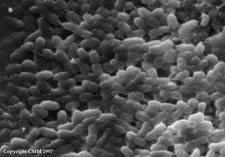
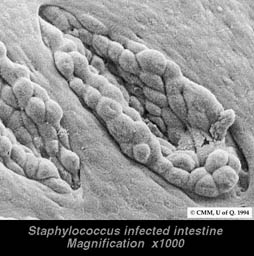
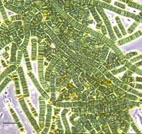
(Left and Center) © 1999, The Centre for Microscopy and Microanalysis (Right) © 1997, Microbial Diversity
Our alien visitor might be forgiven for thinking that Planet Earth is an adventure park and vacation land for bacteria, all rolled into one! He would find bacteria everywhere, lots of them! But bacteria are not the only microbes our alien visitor would find. He is also likely to discover viruses, protozoa, fungi, algae and archaea.
So, what does Earth tell us about living things?
Our planet is teeming with life. Wherever we look we find living things. They are in the air, in water and underground. While the larger organisms such as animal and plants tend to live in habitats we would find normal and welcoming, microorganisms - very tiny life-forms - can be found living not only in these places, but also in the most unlikely habitats - places which at first sight would seem impossible to survive in.
Microbiologists, people who study microbiology, now understand how microorganisms evolved. They and other scientists, including geologists and astronomers, have enabled us to understand the fundamentals of life from the point of view of its chemistry. Some researchers now think with good reason that they are on the verge of creating living organisms from the "raw materials or chemicals" of life. In addition they have found that the habitat conditions that we once thought were necessary to sustain life are much more varied. Such places as the hot acid springs of Yellowstone National Park, and the frozen Lake Vostok deep under thousands of feet of Antarctic ice, are the ideal home for some living things. Most of the these life-forms are microorganisms and they can live in other similarly harsh environments.
These include...

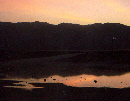



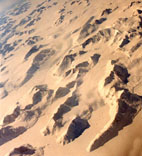
Volcanoes
Alkali Lakes
Hot springs
Seabed
Saltflats
Polar ice
© G Hodges
© J Hodges
© C Hoyland
© J Hodges ©SHodges
As you can see, many of these places are what we humans would consider to be extreme and discovery of microorganisms living in these conditions has led to a name for them - Extremophiles. The microbiologists who study extremophiles now tell us that wherever there is liquid water there can be living things, almost regardless of all other conditions, so that includes the possibility of life in space.
Recently it has become more acceptable to consider the likelihood of alien life existing out there in space. Even the possibility of intelligent life is no longer rejected as science fiction! The SETI Project is monitoring the sky for extraterrestrial radio communications and you too can take part by analyzing the data (for details simply click on the hyperlink). Scientists have considered the conditions that might be necessary for life to flourish. The conditions necessary for simple as opposed to advanced life to survive are different, with life forms such as microbes being much more tolerant. Many scientists now accept that alien life almost certainly exists, at least in microbe form. No doubt this has been helped along by the recent discoveries that have raised some tantalizing possibilities.
Mars, Europa and Callisto, on the balance of evidence all suggest that life may or may once have been present. Other planetary bodies such as Titan, Triton and even Pluto are almost certainly too cold for life. However, they may hold some of the secrets of life's "start-up" chemistry. Smaller Solar System residents - comets and meteorites - also show evidence that life may not be confined to Earth. But beyond the Solar System other planets orbit other star systems. What might lie out there is a question many scientists are asking and investigating. But we have only just started looking ... who knows what we might eventually find...?Do meteorites from Mars contain fossil bacteria?
Does liquid water exist on Jupiter's moon Europa and offer life a habitat?
Does Titan, a moon of Saturn, have the raw chemicals of life in deep-freeze?
Do the icy insides of comets contain microbial life in suspended animation?
Could there be other possible habitats for life in the Solar System?
Will missions to Mars introduce us to Martians?
Is there life in other star systems and even in deep space?
So where next in our quest? Perhaps we should try and discover...
Go
to
Home
| Space Station
| Mars | Rainforest
© 1999 Satellite Events Enterprises Inc.